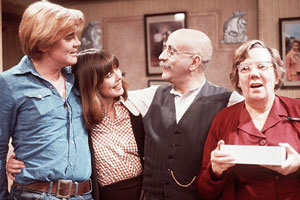Till Death Us Do Part's tumultuous Series 3
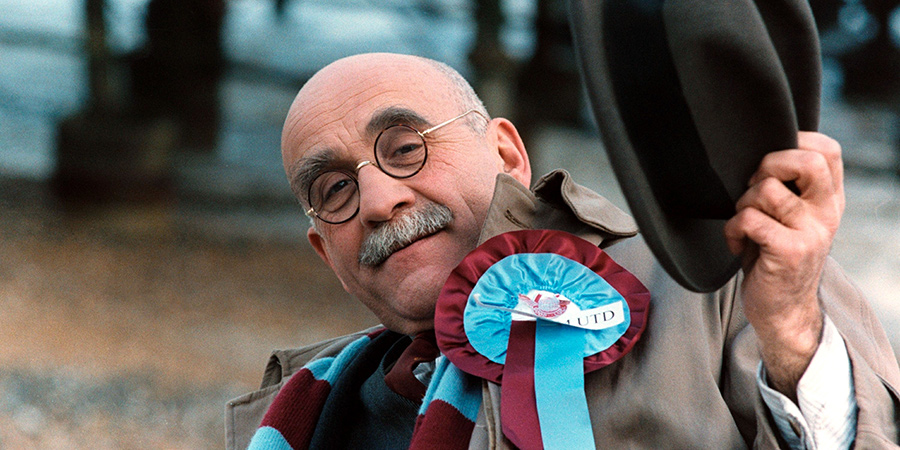
Not too long ago, only one episode from the tumultuous third series of Till Death Us Do Part - The Blood Donor - existed on video. The recovery of three episodes last month adds to a more complete picture of this most controversial of TV comedy series.
Of these three, Monopoly is the most remarkable, since previously this had only been available as an off air audio recording. The other two episodes had previously been recovered from an off air recording on a Phillips EL3400 open reel videotape. Due to the nature of the recording, both shows (later released in the excellent Network TDUDP box set) had integral problems - oxide shedding on the videotape had rendered The Phone's physical condition very poor, whilst Aunt Maud was missing its first three and a half minutes and its closing titles. Now, just over half of the classic third series of Till Death Us Do Part can be seen on video (the remaining stories - The Funeral, Football and The Puppy survive as off air audio recordings). And what an amazingly influential comedy series that was...
Till Death Us Do Part, written by Johnny Speight and starring Warren Mitchell, Dandy Nichols, Anthony Booth and Una Stubbs as the working class family continually at war with each other, had been a tremendous success for the BBC. But it had experienced massive problems both behind the scenes and in its contribution to an increasing national debate on the moral responsibility of television (and in particular the responsibility of the BBC).

The initial friendship between Booth and Speight that had initiated the series had been transplanted by Mitchell, who was not afraid to argue against Speight's inconsistencies in script writing and had thus earned the writer's respect and friendship. But Mitchell despised Booth as an actor and there was interminable conflict in rehearsals.
Furthermore, Speight was consistently irritating to a very indulgent BBC in his late - or even non-existent - delivery of scripts, not providing enough time for executives to either assess their increasingly controversial content, or even to plan an efficient production schedule. The corporation realised that it was paying to book actors to appear in the show, only to find that when Speight finally delivered his revised scripts, the stars weren't needed at all.
The series was also the conspicuous public target of criticism for alleged blasphemy and bad language by Christian groups led by popular figures such as Mary Whitehouse and Malcolm Muggeridge. Into this toxic blend was added a change of BBC Chairman, with the arrival of the no-nonsense Lord Hill overseeing the moral and social shape of the Corporation, and sparking off paranoia in some quarters that he had been parachuted in to tame the excesses of the BBC. However, Speight's show was such an enormous success that executives endured his idiosyncrasies - but all these elements led to a very febrile atmosphere around it. All this came to a head during the making of that third series. Monopoly was integral to it, sparking the blue touchpaper Aunt Maud was to explode, which would ultimately end in Till Death Us Do Part's 1968 cancellation.
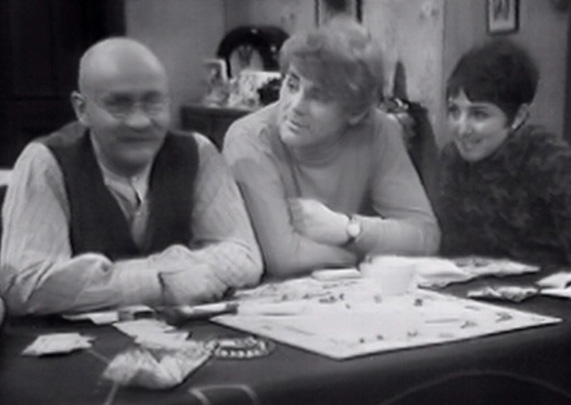
Monopoly, set on New Year's Eve, was designed to open the series with the Garnetts discussing the contemporary political agenda. These small screen arguments were the programme's backbone, featuring Alf's muddled right wing rants versus Mike and Rita's left wing beliefs. This time the family are playing a game of Monopoly as 1967 comes to a close, and their observations over the game reintroduced the satirical clout that characterised the critical and commercial popularity of the comedy. But when Speight submitted his first draft (late as usual, and needing a lot of work from the actors, principally Mitchell), the new Head of Comedy, Michael Mills, criticised it as being too long, with too much "swearing". Speight reluctantly rejigged it and sent it back, but was furious when Mills deemed that despite these revisions, the script was not strong enough as a series opener, replacing it with The Phone.
Speight argued that removing Monopoly from its New Year setting negated its impact: worse still, the Radio Times had already publicised the new series using the political material discussed in the episode, which of course was not on view when The Phone, more of a character piece than political satire, was transmitted in its place on 5th January 1968.
He must therefore have felt more than a little irritated when The Phone, featuring fabulous characterisation and acting, was criticised by some media correspondents as lacking the satirical bite they expected from the show, especially as an opener to a new series. And, in contrast, when Monopoly was transmitted two weeks later, no-one seemed to note any problem regarding its New Year setting. Meanwhile as the run progressed, the huge viewing figures seemed to vindicate both the work of Speight and the indulgence of the BBC towards him. But behind the scenes the final episode - Aunt Maud, broadcast on 16th February - brought the simmering warfare between broadcaster and writer to a climactic conclusion.
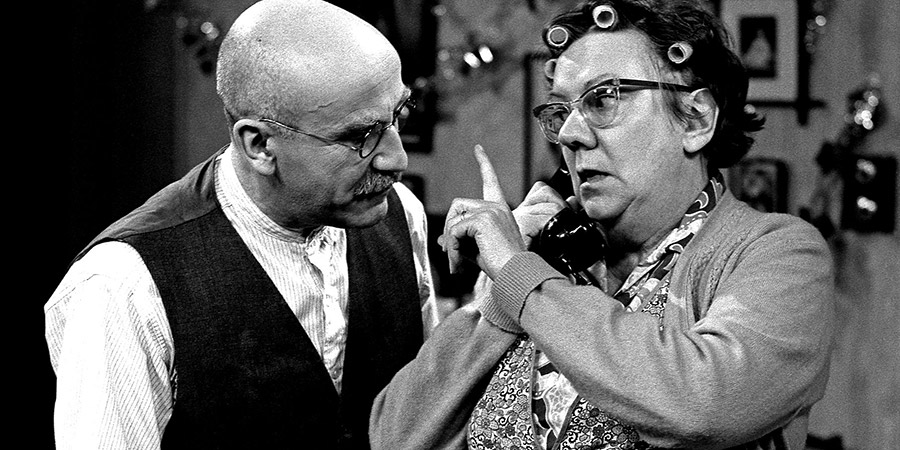
Originally, Speight wanted to end Series 3 with a storyline introducing an old lover of Else's - an intelligent, civilised, softly-spoken man she could have spent her life with compared to the vociferous monster she had actually married. Old wounds would open and and the series would end on a high, blending social and religious critiques with an incisive domestic comedy drama. But at the last minute Dandy Nichols fell ill with bronchitis and could only appear in short sequences rather than throughout the episode; this forced Speight to rewrite the plot. Brilliantly, he used the actress's real life illness as a dramatic plot in which the titular Aunt Maud is brought from Southend to tend her sister.
But as rehearsals began, one glance at the proposed script (delivered late as usual) caused consternation among the higher-ups at the BBC. In particular, one scene in which Mike, in response to Alf's statement that "God is everywhere", even in Wapping, upturns a glass on the table and shouts "Got Him!" The Beeb were adamant that this sequence had to be excised - as well as lines equating God to Hitler. In a stormy meeting involving Mills, various lawyers and the Head of Religious Programming, it was pointed out to an angry Johnny Speight that the Corporation could face legal action for blasphemy. Speight very reluctantly backed down, and the show went ahead, even though the BBC was still worried about its final content. But Speight's fury at what he saw as censorship of his work did not abate.
Aunt Maud is in fact one of the best episodes of Till Death Us Do Part. Besides its truly vicious script, It features a remarkable tour de force performance from Warren Mitchell as Alf; particularly his projectile spitting of a chunk of fish over the dining table at his daughter. But shortly after its transmission two things happened that brought the relationship between Speight and the Corporation to a (temporary) end.
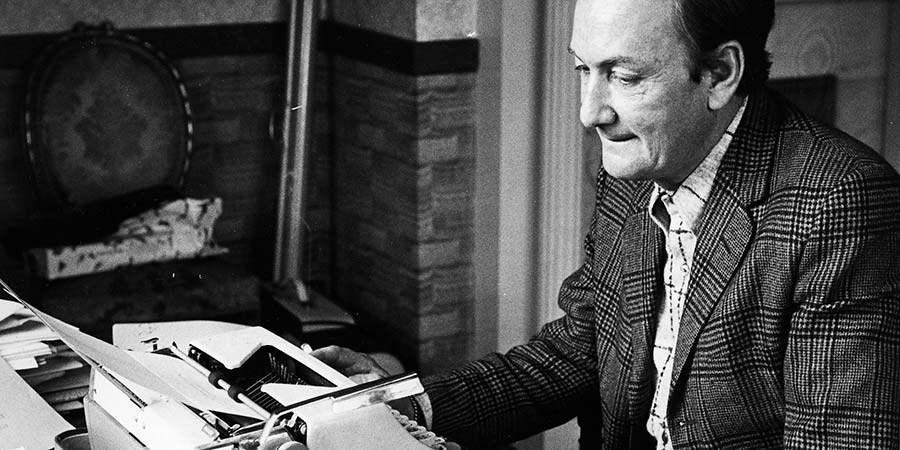
Firstly, Johnny Speight furiously criticised the BBC in the media for its "savage censorship", hinting that he would not write any more Till Death Us Do Part for the Corporation in protest. Simultaneously, Mary Whitehouse and her National Viewers and Listeners Association were incensed by the (remaining) anti-religious content of the episode and announced they would launch legal action for blasphemy. The BBC's worst fears were about to be realised, so they called Speight's bluff. They were fed up with receiving scripts so late that they could barely be assessed or costed. They were particularly irritated that Speight had only written seven scripts when his contract was for eight. And after years of defending their star writer through thick and thin, now he was complaining about their censorship!
Conspicuously, they chose to not ask Speight for a fourth series. The implicit cancellation meant legal action was suspended; and anyway, Johnny Speight knew that Anthony Booth had stated that he would not appear in another - ostensibly because he thought Speight had failed in his mission in breaking new ground in television comedy, but probably because his personal warfare with Warren Mitchell was becoming too much to bear. Thus, shortly after the seventh and final episode of the third series of Till Death Us Do Part was transmitted, and at the height of the sitcom's popularity, it was apparently no more.
Speight went on to write the first feature film of Till Death Us Do Part, filmed later that year (including Booth), the success of which kickstarted the wider early Seventies boom in British TV successes being transferred to the big screen. He would return to the BBC only in 1970, but with the same characters, writing a bizarre political spoof featuring Alf Garnett, set on the evening of the year's General Election.
Alf and Rita, meanwhile, appeared in advert for frozen fish (perhaps inspired by that scene in Aunt Maud!). But Speight's creation took on international status when the original series was picked up for adaptation by US television as All In The Family - achieving as astonishing a success (and an equal level of notoriety) in America.
When the BBC decided that revivals of their old sixties successes - such as Steptoe And Son and The Likely Lads - could counter ITV's overwhelming popular success in TV sitcoms, and compounded by the success of the feature film, Speight was lured back to the Corporation in 1971 to establish a new, colour, series of his problem child.
It would, of course, prove just as popular and just as controversial...
Help us publish more great content by becoming a BCG Supporter. You'll be backing our mission to champion, celebrate and promote British comedy in all its forms: past, present and future.
We understand times are tough, but if you believe in the power of laughter we'd be honoured to have you join us. Advertising doesn't cover our costs, so every single donation matters and is put to good use. Thank you.
Love comedy? Find out moreA Family At War: The Unofficial And Unauthorised Guide To Till Death Us Do Part

This unofficial 300-page guide by Mark Ward is the ultimate, authoritative companion to one of the most infamous and influential sitcoms to have been produced; Till Death Us Do Part.
Contains detailed episode-by-episode guides, and an astonishing amount of detailed miscellany, trivia and fact.
First published: Thursday 18th September 2008
- Publisher: Telos Publishing
- Pages: 300
- Catalogue: 9781845830311
![]() Buy and sell old and new items
Buy and sell old and new items
Search for this product on eBay
BCG may earn commission on sales generated through the links above.
Till Death Us Do Part

Highly popular - and more than a little controversial - Johnny Speight's classic sitcom satirised the less acceptable aspects of conservative working-class culture and the yawning generation gap, creating a sea change in television comedy that influenced just about every sitcom that followed. As relevant today as when first transmitted, Speight's liberal attitude to comedy shone a light on some of the more unsavoury aspects of the national character to great effect.
Starring Warren Mitchell as highly opinionated, true-blue bigot Alf Garnett, Till Death Us Do Part sees him mouthing off on race, immigration, party politics and any other issues that take his fancy. His rantings meet fierce opposition in the form of his left-wing, Liverpudlian layabout son-in-law Mike, while liberal daughter Rita despairs and long-suffering wife Else occasionally wields a sharp put-down of her own.
Though all colour episodes exist, many early black and white episodes were wiped decades ago. The recent recovery of the episode Intolerance, alongside off-air audio recordings, allow this box set to include a complete run of the series from beginning to end.
First released: Monday 12th December 2016
- Distributor: Network
- Region: 2
- Discs: 8
- Minutes: 1,166
- Subtitles: English
- Catalogue: 7954597
![]() Buy and sell old and new items
Buy and sell old and new items
Search for this product on eBay
BCG may earn commission on sales generated through the links above.
Till Death Us Do Part

One of the most controversial - and popular - comedies ever made, Johnny Speight's classic sitcom caustically satirised the less acceptable aspects of entrenched working-class culture in the form of highly opinionated, true-blue bigot Alf Garnett - as played by Warren Mitchell. Making the jump to feature films in 1968, Till Death Us Do Part sees the return of all four series regulars and is featured here as a brand-new high definition transfer from original film elements.
1939. War is declared. But Alf Garnett's got bigger problems on his plate - he's only been married to Else for a few weeks and they're already sick of the sight of each other!
First released: Monday 28th January 2019
- Distributor: Network
- Region: B
- Discs: 1
- Minutes: 100
- Subtitles: English
- Catalogue: 7958177
![]() Buy and sell old and new items
Buy and sell old and new items
Search for this product on eBay
BCG may earn commission on sales generated through the links above.
- Distributor: Network
- Region: 2
- Discs: 1
- Minutes: 96
- Subtitles: English
- Catalogue: 7954982
![]() Buy and sell old and new items
Buy and sell old and new items
Search for this product on eBay
BCG may earn commission on sales generated through the links above.

